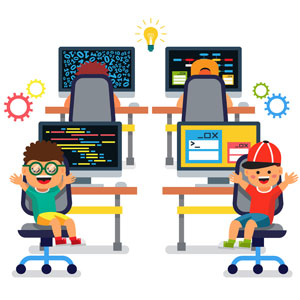ICT
- Curriculum
- Vincentian Values
- Catholic Social Teaching
- EYFS
- Phase Group Curriculum Maps
- Religious Education
- Spiritual, Moral, Social & Cultural Development
- English
- Maths
- Science
- ICT
- Music
- Modern Foreign Language
- Art & Design
- Design Technology
- History and Geography
- Physical Education
- PSHE
- RSE
- The Curriculum Outdoors
- Curriculum
- Vincentian Values
- Catholic Social Teaching
- EYFS
- Phase Group Curriculum Maps
- Religious Education
- Spiritual, Moral, Social & Cultural Development
- English
- Maths
- Science
- ICT
- Music
- Modern Foreign Language
- Art & Design
- Design Technology
- History and Geography
- Physical Education
- PSHE
- RSE
- The Curriculum Outdoors
ICT Curriculum Intent
Our intention is that all young Vincentians will experience success as an information and communication technologist by developing skills within the three strands of the ICT Curriculum (Information Technology, Computer Science and Digital Literacy).
It is essential that children understand how to use software purposefully so that they can create, organise, store, manipulate and retrieve their digital content. Once they understand the purpose and tools available on each software or platform, they will be able to then combine a variety of methods to design and create a range of programs. Children will leave KS2 being able to accomplish given goals by analysing, evaluating and presenting their data and information.
By understanding the use and intention of the software and computer programs children will then be able to test, debug and edit their own programs to achieve a particular goal. This involves problem solving, planning, and logical reasoning and creativity to deconstruct programs. Pupils must understand certain vocabulary like ‘input’ and ‘output’ options to evaluate their effectiveness of the algorithms.

Lastly, the digital literacy strand of the curriculum is highly essential to engaging fully with the other strands. While it is important to understand how and why a program will work, children must use each one safely and sensibly. Demonstrating web-savvy awareness and how pupils can communicate and collaborate with one another online is essential. They must understand and recognise acceptable and unacceptable behaviours and they will learn to report concerns before moving onto Key Stage 3.
With practise, CPD training and proper modelling the children will be able to harness their computer skills and apply them to the wider community. The children will be using a range of senses such as auditory, visual, and kinesthetic skills to develop their computational approach.

Computing National Curriculum Objectives
Click link above to download a copy of the Department of Education's Computing national curriculum objectives.




